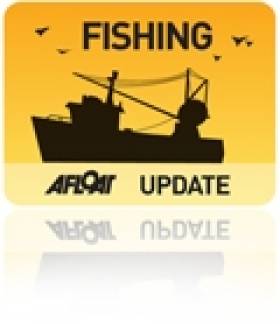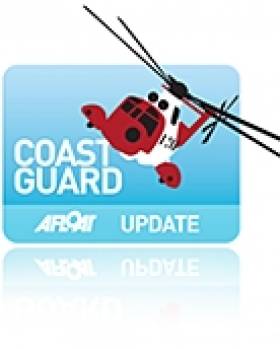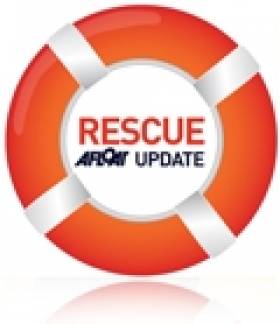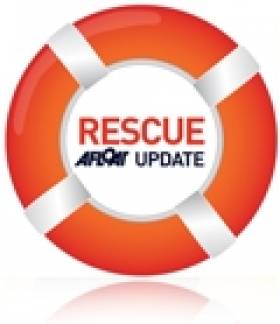Displaying items by tag: Spanish
Body Of Spanish Fisherman Recovered Off Donegal
#Fishing - The Irish Times reports that a post-mortem will be conducted on the remains of a Spanish fisherman found off the Donegal coast early yesterday (Monday 1 June).
According to The Nationalist, the man was believed to have gone overboard from the Spanish fishing trawler on which he was working on Sunday night.
The body of the 56-year-old was recovered from Killybegs Harbour around lunchtime yesterday after a widespread search by local lifeboats and coastguard, and removed to Letterkenny General Hospital.
Search for Missing Spanish Fisherman Off Southwest
#Coastguard - The Irish Coast Guard's Rescue 115 helicopter was tasked overnight to search for a missing Spanish fisherman who fell overboard from his fishing trawler off the southwest coast in the early hours of this morning.
98FM is reporting the latest news on this incident, saying that the man went into the sea some 25 miles off Mizen Head.
The alarm was raised around 4am and the coastguard station at Valentia is co-ordinating the search and rescue effort, with RNLI lifeboats from Baltimore and Castletownbere in West Cork assisting.
Air Corps Patrol Assists in Rescue of Injured Fisherman
#RESCUE - The Irish Times reports that an Air Corps maritime patrol aircraft joined a search and rescue mission to evacuate a fisherman off the West Cork coast today.
The Casa CN 235 - one of two operated by the Air Corps - diverted from its daily patrol to provide a communications relay in the operation to rescue an injured crewman from a Spanish fishing boat some 100 miles south of of Castletownbere.
The fisherman was airlifted by an Irish Coast Guard helicopter which at last report was taking him to medical attention in Cork.
Fisherman on Spanish Boat Airlifted to Cork
The skipper of the fishing vessel Albelo Primero radioed the Irish Coast Guard's Marine Rescue Co-ordination Centre on Wednesday night, reporting that a 33-year-old crewman had taken ill and required emergency medical attention.
The man was airlifted by coastguard helicopter to Cork Airport and transfered by ambulance to Cork University Hospital.
The Irish Times said his condition is not understood to be life-threatening.
European Commission Penalise Spanish for Over-fishing
In a move to protect dwindling fish stocks, the European Commission recently took decisive action by significantly reducing Spain's mackerel quotas over the next few years as a result of over-fishing. This over-fishing of mackerel by the Spanish has been of major concern to the Irish fishing industry and was brought to the attention of the Commission by the Sea-Fisheries Protection Authority (SFPA) and other bodies.
Spanish fishermen landed almost twice as much mackerel in 2010 from the Cantabrian Sea, in the southern part of the Bay of Biscay, as they were permitted. Through their investigations, the European Commission discovered that the mackerel catch exceeded Spain's quota in the year 2010 by 19,621 tonnes. The European Commission has now passed a regulation reducing Spain's future quotas to account for the excess catches. Spain is obliged, in the period between 2011 and 2015, to return twice the amount of mackerel wrongfully caught.
In order to help combat over-fishing the SFPA operates a round the clock monitoring and surveillance programme to ensure the effective control of fish catches and landings. To promote a culture of compliance with National and EU legislation, landings by Irish, EU and Third Country vessels are inspected by the SFPA in Irish ports. Sea-Fisheries Protection Officers engage in a range of at-sea inspection programmes including both inshore and offshore patrols in conjunction with the Naval Service and Joint inspection patrols with other Member States operating in Irish waters and in those of other Member States.
The SFPA will work with Member States and with the Community Fisheries Control Agency (CFCA) based in Vigo, Spain, when a specific control and inspection programme for pelagic fisheries in Western Waters of the North East Atlantic is established - this is expected to be adopted in the near future. This will allow for the co-ordination of joint control, inspection and surveillance activities by Member States for these pelagic fisheries.
Peter Whelan, Chairman of the SFPA said: "The recent decision by the EU to impose sanctions on Spain for over-fishing and to protect the valuable mackerel fishery is significant. There is a need for all Member States to work together and to comply with the Common Fisheries Policy's rules in order to ensure the sustainable development of fisheries. The role of the SFPA supports profitable, sustainable, managed fisheries at a time when the fishing industry faces many challenges. Effective monitoring and control systems safe-guards the good reputation of Irish food producers in the international marketplace and protects Irish taxpayer from the threat of large fines being imposed when non-compliances with the Common Fisheries Policy are encountered. The SFPA will continue with our aim of working with other Member States to promote a uniform standard of monitoring, control and surveillance."


































































